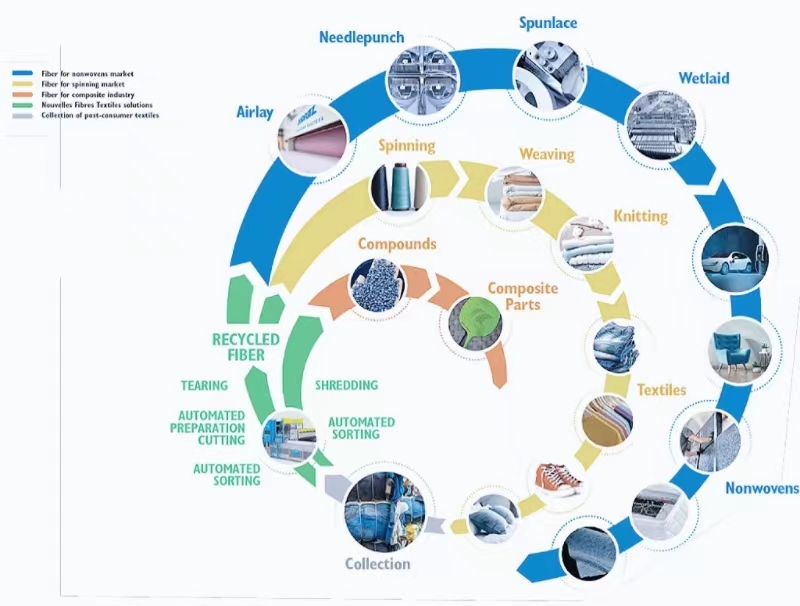Get the latest recycled fiber trend in your inbox.
The textile industry has long been associated with environmental and social challenges due to its resource-intensive processes and often exploitative labor practices. However, in recent years, there has been a growing emphasis on promoting sustainable development within the industry. This article explores the future of sustainable development in the textile industry, focusing on key areas such as eco-friendly materials, circular economy practices, technological advancements, ethical sourcing, and consumer awareness. By adopting innovative approaches and collaborating across the supply chain, the textile industry has the potential to transform into a more sustainable and responsible sector.

The textile industry plays a significant role in our daily lives, providing us with clothing, home textiles, and industrial materials. However, its conventional practices have had detrimental impacts on the environment, including water pollution, high energy consumption, and greenhouse gas emissions. The future of the industry lies in embracing sustainable development practices, which can mitigate these negative effects and create a more responsible and resilient textile industry.
Eco-Friendly Materials: One of the key drivers of sustainable development in the textile industry is the replacement of conventional materials with eco-friendly alternatives. Advances in textile technology have led to the development of innovative and sustainable materials such as organic cotton, recycled polyester, and hemp fibers. These materials have lower environmental footprints, require fewer natural resources, and reduce waste generation. Integrating these materials into the textile supply chain will not only reduce environmental impacts but also meet the increasing demands for sustainable and ethically sourced products.
Circular Economy Practices: The concept of a circular economy, which aims to minimize waste and promote resource efficiency, is gaining traction in the textile industry. Designing products for durability, repairability, and recyclability is crucial for establishing a closed-loop system. By implementing techniques like textile recycling, upcycling, and product take-back programs, the industry can significantly reduce the amount of textile waste ending up in landfills. Additionally, the adoption of innovative recycling technologies, such as chemical and mechanical recycling, is vital for transforming textile waste into valuable raw materials.
Technological Advancements: Technological advancements are instrumental in driving sustainable development in the textile industry. Innovations such as 3D printing, digital textile printing, and nanotechnology present opportunities for resource optimization, increased efficiency, and reduced environmental impact. With 3D printing, textile manufacturers can create complex designs with minimal material waste. Digital textile printing eliminates the need for water-intensive dyeing processes, reducing water consumption and chemical usage. Nanotechnology enables the development of self-cleaning and antimicrobial textiles, reducing the reliance on harsh cleaning chemicals.
Consumer Awareness and Responsible Consumption: The future of sustainable development in the textile industry also relies on consumer awareness and responsible consumption. Educating consumers about the environmental and social impacts of their purchasing decisions is crucial. By embracing the concept of conscious consumerism, individuals can make informed choices, opt for sustainable and ethical brands, and support the demand for eco-friendly products. Furthermore, encouraging practices like clothing repair, second-hand shopping, and garment swaps can extend the lifespan of textiles and reduce the industry's overall environmental footprint.
Collaboration Across the Supply Chain: Achieving sustainable development goals in the textile industry necessitates collaboration and cooperation across the entire supply chain. Brands, manufacturers, suppliers, policymakers, and consumers must work together to implement and enforce sustainability standards. Sharing best practices, knowledge, and resources can create a collective impact, fostering a sustainable textile industry that operates responsibly and transparently.
The future of the textile industry lies in sustainable development practices. By embracing eco-friendly materials, circular economy practices, technological advancements, ethical sourcing, and consumer awareness, the industry can transition towards a more sustainable and responsible framework. The key is to recognize the interconnectedness of environmental, social, and economic factors and strive for holistic change. Together, stakeholders in the textile industry can create a future where fashion and sustainability coexist, promoting a greener and more ethical world.
Get the latest recycled fiber trend in your inbox.